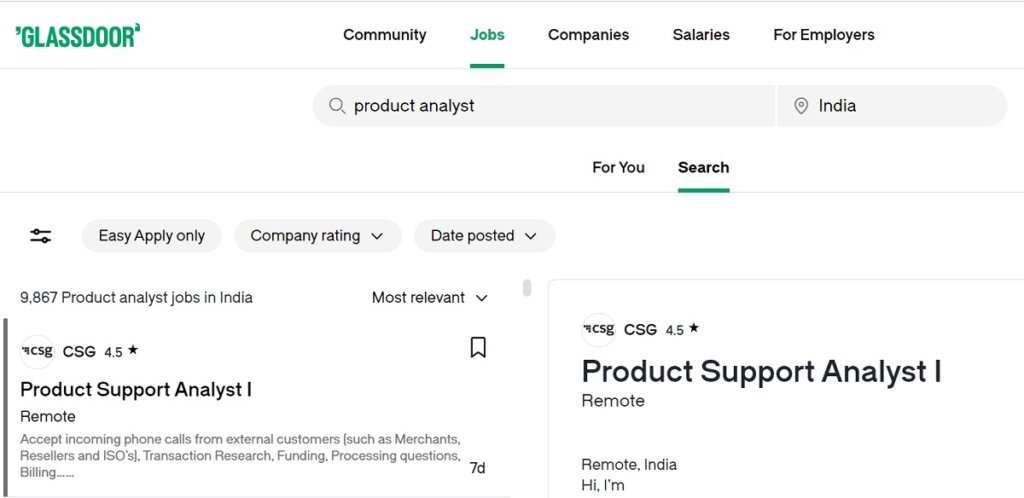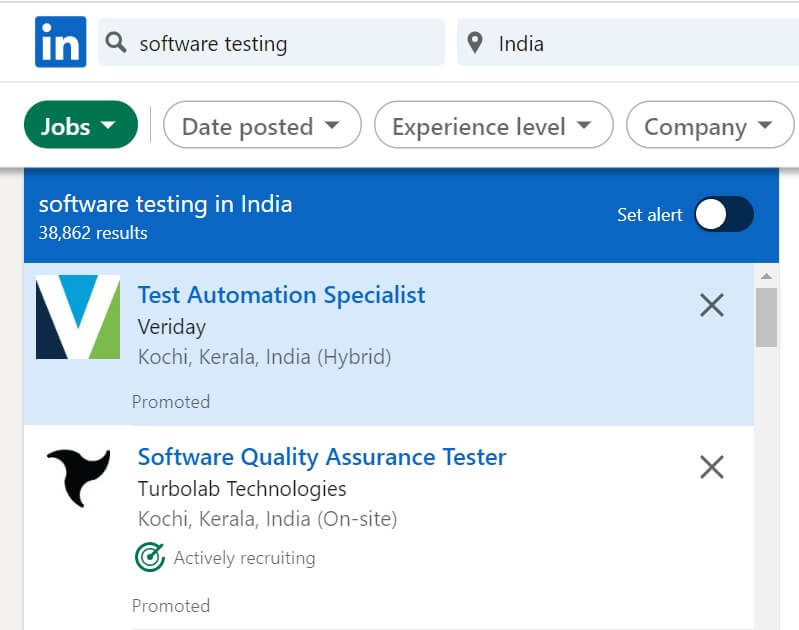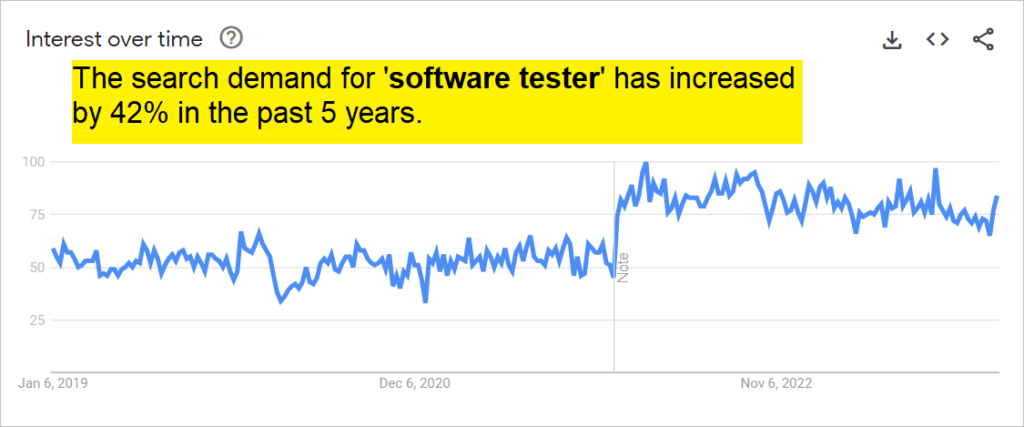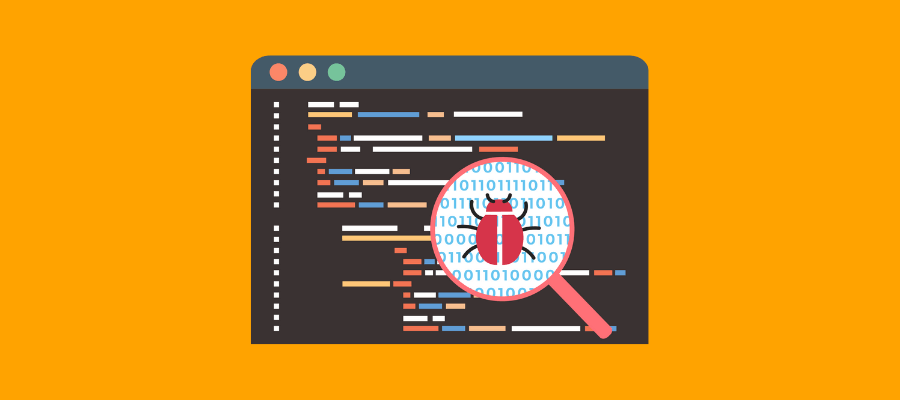Before starting a career in software testing or any other IT tech career, you need to have clear answers about the career scope, job opportunities, required skills, and available resources for learning.
This is why I have created this guide with 5 important software testing career paths and answered all important questions that will help you plan your career roadmap in software testing.
Is Software testing a good career path in 2024?
Yes, software testing is a good career choice in 2024 because of the high demand, easy for freshers to get into the IT field, and good salary.
Here’s a detailed explanation of it:
1. Competitive salary structure
The average salary of a software tester in India is predicted to be around 7.1 LPA and increases proportionally with years of experience.
| Experience Level | Average Salary Range |
| Entry Level | ₹4,00,000 – ₹6,00,000 per annum |
| Early Career (1-4 years) | ₹5,50,000 – ₹8,00,000 per annum |
| Mid Career (4-9 years) | ₹8,00,000 – ₹13,00,000 per annum |
| Experienced (10+) | ₹13,00,000+ per annum |
2. Job opportunities
I found over 34,630 software testing jobs on Glassdoor in India.

Not only Glassdoor, but LinkedIn also have over 38,000 opportunities available in India.

This shows the availability of part-time and full-time job roles in the software testing field in India.
3. High demand
The demand for skilled software testers is consistently high due to the ever-growing software industry, as new software products are being introduced every day.
The companies are in constant competition to make their products stand out. That’s why there is always demand for software testers to ensure their products meet their customers’ needs.
The search demand for the search term “software tester” has increased by 42.37% in the past 5 years, according to Google Trends data.

4. No prior experience is required
Many entry-level software testing positions don’t require prior experience. Employers are more focused on your aptitude, willingness to learn, and problem-solving skills.
4. No particular educational background is required
Software testing is a field that is open to individuals from all educational backgrounds. With the right skills and attitude, anyone can make a successful career in software testing.
While a background in computer science or a related field can be beneficial, it is not essential.
Many successful software testers come from diverse educational backgrounds, including BSc, BCA, MSc, MCA, or any engineering stream, humanities, social sciences, and non-technical fields.
What is software testing?
Software testing is the process of evaluating the functionality of a software product or application to make sure that it meets the specific requirements and produces the desired results.
It involves verifying and validating that the software works correctly and identifying any defects or errors that must be solved before the product is released to the end users.
It is the fifth process in the software development life cycle (SDLC) following the four stages of analyzing, planning, designing and development.
What do software testing engineers do?
Software testing engineers ensure the quality and performance of software products are up to the mark. They test the software applications to find and resolve issues before the application is made public.
Testing involves some coding, but it is not purely a coding job. Testers use coding skills to create automated tests and analyze code, but they focus on testing software functionality and quality.
Day to Day tasks include:
- Designing and developing test cases
- Executing the tests on software applications to identify defects and issues
- Work with software developers to resolve the issue and ultimately improve the product performance
- Automate the test processes to improve efficiency and accuracy
- Analyze the test results and give feedback to the development team
Career Progression of Software Testing Engineers
1. QA Tester or Test Engineer (0-2 years)
Entry-level role focusing on executing test cases and reporting defects.
Required skills:
- Programming skills in at least one language (e.g., Java, Python, C#)
- Basic understanding of software testing methodologies
- Proficient in using defect-tracking tools
Expected pay: $40,000 – $60,000 in US and ₹3,200,000 – ₹4,800,000 in India
2. Senior Test Engineer (3-5 years)
Leading testing efforts, designing test plans, and mentoring junior testers.
Required skills:
- In-depth knowledge of software testing methodologies and tools
- Experience in leading test teams and mentoring junior testers
- Strong communication and collaboration skills
Expected pay: $60,000 – $80,000 in the US and ₹4,800,000 – ₹6,400,000 in India
3. Test Lead/Manager (6-10 years)
Overseeing testing teams, creating test strategies, and collaborating with development teams.
Required skills:
- Expertise in test strategy development and test plan creation
- Ability to manage and motivate testing teams
- Proficient in communicating with stakeholders at all levels
Expected pay: $80,000 – $120,000 in Us and ₹6,400,000 – ₹9,600,000 in india
4. Test Architect (10+ years)
Setting testing standards, implementing testing tools, and advising on overall testing framework and strategy.
Required skills:
- Extensive experience in software testing and quality assurance
- Deep understanding of software development methodologies and frameworks
- Ability to design and implement testing tools and frameworks
Expected pay: $120,000 – $150,000 in US and ₹9,600,000 – ₹12,000,000 in India
NOTE: You are not restricted to following the process mentioned above. Your career path is your journey that you decide.
Software testing engineer career paths in 2024
In the field of software testing, you can begin as a Software Tester Trainee and progress to more advanced roles over time.
This section will outline the career path available to testers as they gain experience and grow in the field.
1. Manual Tester
A manual tester is a software quality assurance professional that checks if the software meets its requirements and is functioning properly. They do this by manually executing test cases, identifying and reporting bugs, and working with developers to fix the issues.
Years of experience required: 0-2 years
Role type: Entry-level
Average annual salary: INR 4,85,507 in India, $72,535 in the US.
Job responsibilities:
- Creating and executing manual test cases to identify software defects.
- Collaborating with the development team to report and resolve the issues
- Documenting and tracking software bugs and their progress.
- Participating in requirement analysis and test strategy development.
- Conducting regression testing to ensure software stability after modifications.
Key skills required:
- Strong attention to detail
- Analytical thinking
- Knowledge of testing methodologies and tools
- Good communication and teamwork skills
- Understanding of software development life cycle (SDLC)
2. Performance tester or Quality Assurance
A performance tester is responsible for evaluating the responsiveness, scalability, and stability of software applications and systems under various load conditions. Performance testers play an important role in ensuring the reliability and efficiency of software applications to meet user demands or business requirements.
Years of experience required: 2-5 years
Role type: Mid-level
Average annual salary: INR ₹7,35,475 in India, $106,021 in the US.
Job responsibilities:
- Designing and implementing performance test strategies, plans, and scripts
- Executing performance tests to assess system behaviour under various load conditions
- Analyzing test results to identify performance bottlenecks and areas for optimization
- Collaborating with development and infrastructure teams to troubleshoot and resolve performance issues
- Providing recommendations for system improvements based on performance testing outcomes
- Utilizing performance testing tools and methodologies to ensure software scalability and reliability
Key skills required:
- Expertise in performance testing tools like JMeter, LoadRunner, or Gatling
- Strong understanding of performance testing concepts, methodologies, and best practices
- Knowledge of software development life cycle (SDLC) and application architecture
- Analytical and problem-solving skills
- Scripting and programming skills may be beneficial (e.g., with languages like Java, Python, or others)
3. Security tester
A security tester safeguards the applications and systems from potential cyber threats and ensures the confidentiality, integrity, and availability of sensitive information. Software testers evaluate the security measures implemented to find potential vulnerabilities and weaknesses.
Years of experience required: 3-5 years
Role type: Mid-level
Average annual salary: INR 7,54,119 in India, $119,695 in the US.
Job responsibilities:
- Conducting security tests and penetration testing to identify vulnerabilities in software systems
- Analyzing security test results and providing detailed reports on identified risks and recommended solutions
- Collaborating with development and IT teams to address security vulnerabilities and implement protective measures
- Staying updated with the latest security risks, and best practices within the field.
Key skills required:
- Proficiency in security testing tools such as Metasploit, Burp Suite, or Nessus
- In-depth understanding of common security vulnerabilities and exploitation techniques
- Understanding of networking protocols, operating systems, and web applications.
- Strong analytical and problem-solving skills
- Familiarity with compliance standards and regulations such as GDPR, PCI DSS, or HIPAA
4. Automation Tester
An automation tester creates and implements automated tests to streamline the testing process, identify defects more efficiently, and fasten the process of delivering software products.
Years of experience required: 3-5 years
Role type: Mid-level
Average annual salary: INR ₹8,03,133 in India, $97,595 in the US.
Job responsibilities:
- Developing and implementing automated test scripts and frameworks.
- Executing automated tests, analyzing results, and identifying software defects or performance issues.
- Working together with different teams to understand what needs to be tested and make sure that all areas are included in the tests.
- Participating in the continuous improvement of automated testing processes and tools.
- Providing feedback and recommendations to improve overall software quality and testing efficiency
Key skills required:
- Experience in automation testing tools such as Selenium, Appium, or TestComplete
- Strong coding abilities in languages like Java, Python, or C#
- Understanding of software development methodologies and QA processes
- Knowledge of continuous integration and continuous deployment (CI/CD) practices
- Excellent analytical and problem-solving abilities.
5. Software Development Engineer in Test (SDET)
Software Development Engineers in Test (SDET) have diverse roles, where they combine skills in software development and testing.
This focus on both coding and testing allows them to contribute to the entire software development lifecycle and maintain high-quality standards.
NOTE: Software Development Engineers in Test (SDET) are professionals who bridge the gap between software development and testing. SDETs have diverse roles, where they combine skills in software development and testing.
Years of experience required: 3+ years
Role type: Mid-level
Average annual salary: INR 14,90,000 in India, $117,257 in the US.
Job responsibilities:
- Design, develop, and maintain automated test scripts and frameworks.
- Identify and implement test automation strategies.
- Execute automated tests and analyze results.
- Collaborate with developers to fix defects and improve test coverage.
- Contribute to overall software design and architecture with a testing mindset.
- Participate in agile development processes and continuous integration/continuous delivery (CI/CD) pipelines.
- Stay up-to-date on the latest testing tools and technologies.
- Document test automation procedures.
Key skills required:
- Programming languages: Java, Python, or C#.
- Strong understanding of software development methodologies and tools.
- Expertise in automated testing tools such as Selenium, Appium, or Cypress.
- Familiarity with software testing methodologies and frameworks.
- Knowledge of web technologies, APIs, and database systems.
- Excellent problem-solving and analytical skills.
- Good communication and collaboration skills.
Job Outlooks for Software Testing
The Job Outlook for software testers is very promising. The U.S. Bureau of Labor Statistics (BLS) projects that employment for software testers has grown 20% from 2022 to 2032.
Several factors contribute to this positive outlook:
- As software products and applications become increasingly complex, the need for thorough testing to ensure their quality and reliability grows.
- As more companies and teams move towards DevOps, they are also starting to place a greater focus on testing at every stage of the software development process. This means that testing is no longer just an afterthought, but an integral part of the entire development cycle.
These factors create a favourable market for software testers by providing opportunities for growth and career advancements in the field.
Skills and Prerequisites to be a software tester
When it comes to pursuing a career in software testing, certain technical and soft skills can lay a solid foundation for a successful career as a software tester.
1. Strong Analytical Thinking
Strong analytical skills are very important for a software tester. This will help you in breaking down complex problems and identify the root cause of issues. Through critical thinking and logical reasoning, you can analyze test results effectively and provide actionable insights to the development team.
2. Attention to Detail
You need to be able to spot even the tiniest errors or irregularities in the system. This skill ensures that all aspects of the software are thoroughly tested, leaving no room for potential bugs or glitches.
3. Software testing methodologies
Familiarize yourself with software testing methodologies like Agile, Waterfall, and Scrum to effectively plan and execute testing activities.
4. Testing tools and techniques:
Knowledge of various testing tools such as Selenium, Appium, and JMeter to conduct different types of testing, like functional, performance, and security testing.
5. Software development lifecycle (SDLC)
Familiarity with SDLC is important as it will help them understand the big picture of how software is developed therefore they can plan and test efficiently as per needs
6. Programming languages
Knowledge of Programming languages like Java, Python, or C# will help develop automated test scripts and frameworks.
How much do software testers make?
In India, the average salary for software testers is around ₹486,815 (approximately $6,000) per annum, while in the US, the average salary is about $56,468 per year.
Below are the top 5 cities in India and the US for software testers, based on salary data from AmbitionBox and Glassdoor:
The average annual salary of software testers in India:
| City | Average Annual Salary (INR) |
| Bangalore | 580,422 |
| Noida | 528,453 |
| Pune | 554,385 |
| Hyderabad | 541,049 |
| Mumbai | 547,856 |
The average annual salary of software testers in the US:
| City | Average Annual Salary (USD) |
| Mountain View | $81,581 |
| San Francisco | $79,382 |
| San Jose | $78,941 |
| Sunnyvale | $78,031 |
| Seattle | $76,731 |
How Difficult is Software Testing?
The difficulty of software testing varies depending on a few factors including the tester’s experience, the complexity of the application being tested, and the specific testing tools and techniques being used. However, in general, software testing is easy to master as it doesn’t demand a lot of technical and hands-on experience.
- Start with the basics: Familiarize yourself with the fundamental concepts of software testing, including types of testing, test planning, test case design, and defect management. Online courses like “Software Testing Fundamentals” or “Introduction to Software Testing” can provide a solid foundation.
- Gain hands-on experience: Put your knowledge into practice by working on projects and practising different testing techniques. Do some side projects for your portfolio or collaborate on open-source projects to gain practical experience.
- Learn automation testing: Automation is a crucial aspect of software testing. Understand popular automation testing frameworks like Selenium, Appium, or Cypress. Courses like “Certified Selenium Professional” or “Certified Mobile App Tester” can help you specialize in these areas.
- Explore advanced concepts and tools: As you progress, delve into more advanced topics such as performance testing, security testing, and exploratory testing. Familiarize yourself with tools commonly used in the industry, such as JIRA for defect tracking or Jenkins for continuous integration.
Learning software testing is an ongoing process. Continuously try to expand your knowledge, practice your skills, and never stop exploring new ways to improve your testing expertise.
So, if you are someone entering the field of software testing, remember that while at first, it can be challenging, it’s also rewarding and offers a lot of opportunities for growth and development.
Future of Software testers—will AI replace Software testers?
No, AI won’t completely replace software testers for the following reasons:
- AI doesn’t have the same creativity and intuition as humans: might not be able to identify complex bugs or unusual situations that a human tester could find.
- AI systems still need human supervision: to make sure that they are producing accurate and reliable test results because there are certain aspects, like user experience and emotions, that AI may not fully understand. Human testers can evaluate these subjective elements and make important decisions and judgments during the testing process.
Although AI is a powerful tool that can automate various tasks in software testing, it cannot replace the importance of human software testers. Human testers are important for ensuring the quality and dependability of software.
The skills and expertise that software testers bring are necessary for the development of high-quality software products.
Software testing certifications to start your career
1. Certified Tester Foundation Level by International Software Testing Qualifications Board
Course fee: $250
Duration: 60 hours
This is a foundational certification that covers the core concepts of software testing.
It is globally recognized and provides a solid foundation for a career in software testing.
The certification exam is for 60 minutes and results are given within 5 business days of taking the exam.
It can demonstrate your knowledge and skills to potential employers and help you stand out in a competitive job market.
2. Software Testing Fundamentals on Udemy
Course fee: INR 400
Duration: 14 hours
The comprehensive online course provides a solid foundation in software testing concepts and techniques. It is taught by Yogesh Dahake, an experienced software testing professional and contains practical exercises to solidify your understanding. It is a self-paced learning course, so you can learn at your own pace and revisit topics as and when needed.
This course will be good for aspiring software testers, software developers who want to expand their skills and Quality Assurance specialists who want to deepen their knowledge of software techniques.
3. Introduction to Software Testing by Coursera
Course Fee: Free
Duration: 30 hours
This introductory course is offered by Stanford University on Coursera and covers test case design, test planning, and test execution.
The course has a combination of video lectures, interactive exercises, bug reporting, and hands-on projects to keep you engaged and actively learning.
Relevant resources:
- Find the best software engineering courses after 12th standard
- Top software testing training institutes in Bangalore
Is software testing the right career path for you?
Answer the following questions and calculate your scoring to self-assess your career suitability in software testing:
What aspect of software development interests you the most?
- Writing code – 1 point
- Solving complex problems – 2 points
- Ensuring quality and reliability – 3 points
How do you feel about repetitive tasks and attention to detail?
- Enjoy them – 3 points
- Tolerate them – 2 points
- Dislike them – 1 point
What is your approach to problem-solving?
- Analytical and systematic – 3 points
- Intuitive and creative – 2 points
- Adaptive and flexible – 1 point
How do you handle pressure and tight deadlines?
- Stay calm and focused – 3 points
- Get stressed but manage – 2 points
- Struggle to cope – 1 point
What role do you think communication plays in software testing?
- Minimal importance – 1 point
- Somewhat important – 2 points
- Very important – 3 points
What do you think is the primary goal of software testing?
- Writing code efficiently – 1 point
- Delivering software quickly – 2 points
- Finding and preventing defects – 3 points
How do you feel about learning new tools and technologies?
- Excited to learn new things – 3 points
- Willing to learn if necessary – 2 points
- Prefer sticking to familiar tools – 1 point
What is your attitude towards documentation and reporting?
- Enjoy documenting processes – 3 points
- Can do it when required – 2 points
- Find it tedious – 1 point
How important is collaboration with developers and other team members in your work?
- Not important at all – 1 point
- Somewhat important – 2 points
- Very important – 3 points
How do you handle uncertainty and ambiguity in requirements?
- Comfortable navigating uncertainty – 3 points
- Adapt to changes easily – 2 points
- Find it challenging but manageable – 1 point
Now, add up your total score to assess your compatibility with a career in software testing:
Once you’ve answered the above questions, calculate your total score based on the numbers and match with the below table:
| Score Range | Suitability for software testing career |
| 10-15 | Low Suitability |
| 16-24 | Moderate Suitability |
| 25-30 | High Suitability |
Final words
I hope this guide will answer all of your questions from understanding career scope to finding the best resources to start learning.
If you have any queries or doubts, contact me.

Tata Sai Nandini is an IT Professional with experience in the Python and Data Science domain. With expertise in Statistical Analysis, Exploratory Data Analysis, Data Visualization, Data Extraction, Data Wrangling, Image Processing, Text Processing, and the creation of Machine Learning and Deep Learning models, she is a versatile and skilled practitioner in the field. Tata Sai Nandini’s skillset encompasses a wide range of tools and technologies, including Python, C++, C, various IDEs, Python libraries, data visualization tools, and machine learning and deep learning frameworks.

